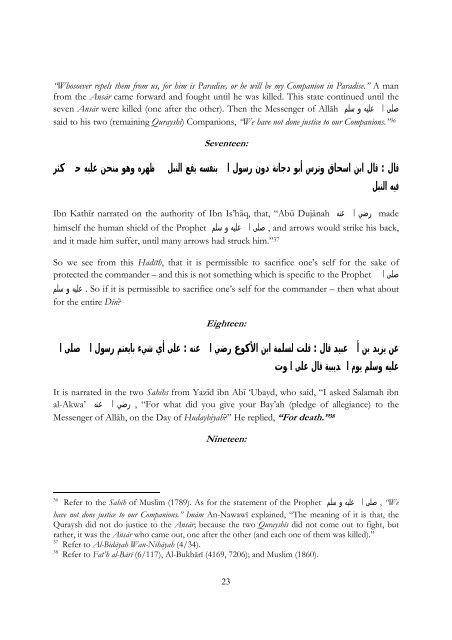the-islamic-ruling-on-the-permissibility-of-self-sacrificial-operations-suicide-or-martyrdom
the-islamic-ruling-on-the-permissibility-of-self-sacrificial-operations-suicide-or-martyrdom
the-islamic-ruling-on-the-permissibility-of-self-sacrificial-operations-suicide-or-martyrdom
Create successful ePaper yourself
Turn your PDF publications into a flip-book with our unique Google optimized e-Paper software.
“Whosoever repels <str<strong>on</strong>g>the</str<strong>on</strong>g>m from us, f<strong>or</strong> him is Paradise, <strong>or</strong> he will be my Compani<strong>on</strong> in Paradise.” A man<br />
from <str<strong>on</strong>g>the</str<strong>on</strong>g> Ansār came f<strong>or</strong>ward and fought until he was killed. This state c<strong>on</strong>tinued until <str<strong>on</strong>g>the</str<strong>on</strong>g><br />
صلى االله عليه و سلم seven Ansār were killed (<strong>on</strong>e after <str<strong>on</strong>g>the</str<strong>on</strong>g> o<str<strong>on</strong>g>the</str<strong>on</strong>g>r). Then <str<strong>on</strong>g>the</str<strong>on</strong>g> Messenger <strong>of</strong> Allāh<br />
said to his two (remaining Qurayshī) Compani<strong>on</strong>s, “We have not d<strong>on</strong>e justice to our Compani<strong>on</strong>s.” 36<br />
Seventeen:<br />
قال قال ابن اسحاق وترس أبو دجانة دون رسول االله بنفسه يقع النبل في ظهره وهو منحن عليه حتى كثر<br />
فيه النبل<br />
Ibn Kathīr narrated <strong>on</strong> <str<strong>on</strong>g>the</str<strong>on</strong>g> auth<strong>or</strong>ity <strong>of</strong> Ibn Is’hāq, that, “Abū Dujānah رضي االله عنه made<br />
him<strong>self</strong> <str<strong>on</strong>g>the</str<strong>on</strong>g> human shield <strong>of</strong> <str<strong>on</strong>g>the</str<strong>on</strong>g> Prophet صلى االله عليه و سلم , and arrows would strike his back,<br />
and it made him suffer, until many arrows had struck him.” 37<br />
So we see from this Hadīth, that it is permissible to sacrifice <strong>on</strong>e’s <strong>self</strong> f<strong>or</strong> <str<strong>on</strong>g>the</str<strong>on</strong>g> sake <strong>of</strong><br />
صلى االله protected <str<strong>on</strong>g>the</str<strong>on</strong>g> commander – and this is not something which is specific to <str<strong>on</strong>g>the</str<strong>on</strong>g> Prophet<br />
. So if it is permissible to sacrifice <strong>on</strong>e’s <strong>self</strong> f<strong>or</strong> <str<strong>on</strong>g>the</str<strong>on</strong>g> commander – <str<strong>on</strong>g>the</str<strong>on</strong>g>n what about عليه و سلم<br />
f<strong>or</strong> <str<strong>on</strong>g>the</str<strong>on</strong>g> entire Dīn<br />
:<br />
Eighteen:<br />
عن يزيد بن أبي عبيد قال قلت لسلمة ابن الأكوع رضي االله عنه<br />
عليه وسلم يوم الحديبية قال على الموت<br />
على أي شيء بايعتم رسول االله صلى االله<br />
It is narrated in <str<strong>on</strong>g>the</str<strong>on</strong>g> two Sahīhs from Yazīd ibn Abī ‘Ubayd, who said, “I asked Salamah ibn<br />
al-Akwa’ رضي االله عنه , “F<strong>or</strong> what did you give your Bay’ah (pledge <strong>of</strong> allegiance) to <str<strong>on</strong>g>the</str<strong>on</strong>g><br />
Messenger <strong>of</strong> Allāh, <strong>on</strong> <str<strong>on</strong>g>the</str<strong>on</strong>g> Day <strong>of</strong> Hudaybiyah” He replied, “F<strong>or</strong> death.” 38<br />
Nineteen:<br />
:<br />
:<br />
36<br />
Refer to <str<strong>on</strong>g>the</str<strong>on</strong>g> Sahīh <strong>of</strong> Muslim (1789). As f<strong>or</strong> <str<strong>on</strong>g>the</str<strong>on</strong>g> statement <strong>of</strong> <str<strong>on</strong>g>the</str<strong>on</strong>g> Prophet صلى االله عليه و سلم , “We<br />
have not d<strong>on</strong>e justice to our Compani<strong>on</strong>s.” Imām An-Nawawī explained, “The meaning <strong>of</strong> it is that, <str<strong>on</strong>g>the</str<strong>on</strong>g><br />
Quraysh did not do justice to <str<strong>on</strong>g>the</str<strong>on</strong>g> Ansār; because <str<strong>on</strong>g>the</str<strong>on</strong>g> two Qurayshīs did not come out to fight, but<br />
ra<str<strong>on</strong>g>the</str<strong>on</strong>g>r, it was <str<strong>on</strong>g>the</str<strong>on</strong>g> Ansār who came out, <strong>on</strong>e after <str<strong>on</strong>g>the</str<strong>on</strong>g> o<str<strong>on</strong>g>the</str<strong>on</strong>g>r (and each <strong>on</strong>e <strong>of</strong> <str<strong>on</strong>g>the</str<strong>on</strong>g>m was killed).”<br />
37 Refer to Al-Bidāyah Wan-Nihāyah (4/34).<br />
38<br />
Refer to Fat’h al-Bārī (6/117), Al-Bukhārī (4169, 7206); and Muslim (1860).<br />
23


